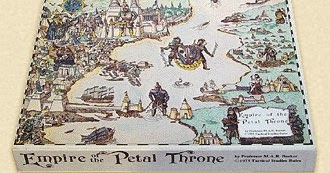I read that blog. Here are the two paragraphs that stood out to me:According to Shannon Appelcline over at RPG.net Barker's pseudonymous novel has been used as neo-Nazi indoctrination material and was published by the same publisher as the Turner Diaries. Appelcline's article says everything I've been trying to articulate about this idea better than I'm able to so I'm going to drop a link to it here - I think Shannon is right about all of this.
Fundamentally, anyone interested in world of Tékumel will now have to go through the setting with a careful eye. Though it's been noted that Barker's authoring of his pro-Nazi novel was much later than his main creative period for Tékumel, we have no way of knowing how the attitudes suggested in the book may have influenced Barker's fantasy world. Some have noted that fascist ethnostates of Tékumel could have drawn upon Nazi desires, others that its history may reflect the Nazi's "Kampf um Lebensraum" concept. It's almost impossible to say whether these were purposeful (or even subconscious) connections, especially given the common (yet potentially problematic) usage of fascist ethnostates in fantasy literature and gaming. But a knowledgeable gamer is unlikely to ever be able to look at Tékumel again without worrying about these issues.
The Tékumel Foundation's decision to, at the least, passively cover up Barker's authorship of a Nazi novel for a decade makes the whole situation even more problematic. They denied a decade's worth of players the agency to make a decision about whether it was ethical to play in the world of Tékumel, and worse they denied them the personal ability to assess whether there were Nazi tropes in the design or the world or not. In doing so, they also denied themselves the ability to control the narrative, such as by bringing in experts on Nazi indoctrination who could themselves have combed through Tékumel to spot any problematic elements.
The Tékumel Foundation's decision to, at the least, passively cover up Barker's authorship of a Nazi novel for a decade makes the whole situation even more problematic. They denied a decade's worth of players the agency to make a decision about whether it was ethical to play in the world of Tékumel, and worse they denied them the personal ability to assess whether there were Nazi tropes in the design or the world or not. In doing so, they also denied themselves the ability to control the narrative, such as by bringing in experts on Nazi indoctrination who could themselves have combed through Tékumel to spot any problematic elements.
I have trouble with the idea that we need experts on Nazi indoctrination to tell us whether or not there are "problematic elements" in Tekumel. Or that the existence of such elements, and their possible effects on readers, is in some way conditional on the political views of its author, such that either (i) we couldn't spot them until we knew those views, or (ii) a given motif will have a different effect depending on the political views of its creator.
Tekumel is what it is. It stands, or falls, on its own terms as a work. Upthread I mentioned some features which are consistent with extreme reactionary and even racist politics. As Appelcline notes, those features don't distinguish Tekumel from many other fantasy worlds. The thematic connections between fantasy as a genre and reactionary politics have been discussed for a long time. This Barker revelation is a new data point as far as those connections are concerned, and it may be significant for those who are interested in the origins of Tekumel and Barker's creative process. But the risk of Tekumel turning its readers, and those who play RPGs set in it, into Neo-Nazis is no greater today than it was yesterday. (Unless neo-Nazis develop a new enthusiasm for it in light of these revelations, and start recruiting by running RPGs set in Tekumel. But that would tell us nothing new about Tekumel - neo-Nazis could recruit just as easily running RPGs set in Greyhawk, or in Middle Earth.)
I also find the criticisms of the Tekumel Foundation a bit unfair. Nothing the Foundation did denied anyone the opportunity to assess the existence of Nazi tropes in Tekumel. You do that by reading Tekumel with an eye open for Nazi tropes; and people have been able to do that, if they wanted to, since 1975.
What they really did was kept secret a fact about MAR Barker. So they denied people the opportunity to form a fully-informed view of MAR Barker's character. Framing this as the denial of a capacity to critically examine his work, or to form a view about the ethics of engaging with it, strikes me as a round-about way of making the point.




